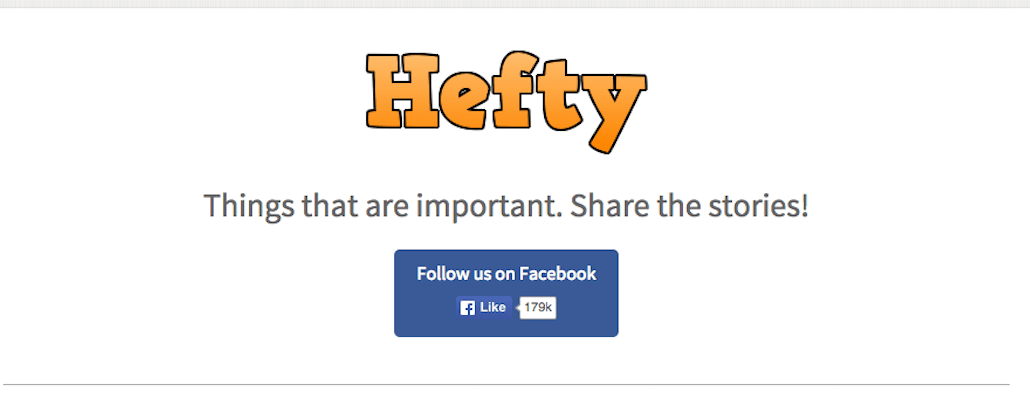Save 50% on a 3-month Digiday+ membership. Ends Dec 5.
German site Heftig modeled itself after Upworthy, and what happened next will blow your mind

Three years ago, Upworthy burst on the scene with a recipe of feel-good, mission-driven videos packaged up with viral headlines. Upworthy is pivoting from its aggregation roots to focus on original content as its traffic has dropped precipitously from a peak of 50 million last summer. But that hasn’t stopped others from riffing off Upworthy’s successful formula.
One of the biggest lookalikes is Germany’s Heftig.co. A pair of Berlin-based Internet entrepreneurs, Michael Gloess and Peter Schilling, quietly launched the site in early 2014. Eighteen months later, they claim to reach 50 million monthly uniques across the German site and its English, Spanish, French and Portuguese offshoots, citing Google Analytics. (ComScore puts Heftig at 2.8 million uniques, but that’s an incomplete picture, as it’s the German- and desktop-only audience.) And it has bigger ambitions.
The content on Heftig, which translates loosely to “fierce” (its English-language counterpart, Hefty.co, didn’t quite nail the name) is familiar to anyone who has come across an Upworthy post, although it’s more inspirational- and curiosity- than mission-driven.
The key to the site’s viral growth isn’t volume (it posts just three stories a day with a scant staff of just 16), but as they described in a rare, recent interview at an online marketing conference, extensive testing of headlines and images. Two of its most popular posts on Facebook recently, about a money-saving trick and a child’s tragic end, were shared nearly 18,000 and 11,000 times, respectively.
Sie zwingen den 16-Jährigen, die Busscheibe abzulecken. 2 Tage später ist er tot.
Posted by Heftig on Thursday, June 11, 2015
“It’s the strong, positive, emotional and also entertaining stories that get the biggest reach,” spokesman Thomas Huber explained in an email to Digiday. “It’s the unique stories that give people a deeper feeling about themselves and the world we live in. They transport a positive feeling that everyone wants to share.”
Like other social publishers, Heftig owes much of its success to Facebook, where the flagship has 1.7 million fans. Last month, Heftig.co was the third-largest German media company on the social network, behind the tabloid Bild and Sport1, in terms of interactions on its Facebook page, said Brandon Silverman, CEO of CrowdTangle.
Heftig’s growth is all the more notable in light of the smaller overall population — and small venture capital scene — in Germany, with its suspicion of startups and conservative advertising market. Indeed, most of the advertisements on Heftig are retargeted ads.
Ad position: web_incontent_pos1
“This is a really huge success story, to build such a huge number of users in such a short time,” said Frankfort-based Boris Meixner, client service director, digital at Starcom.
Still, continued growth is far from assured. Already, Heftig’s traffic is down in the past year, by comScore’s (desktop) measure. Outside the U.S., where less original content is being created, there’s still room for aggregator sites to grow, Silverman said. But as Facebook favors original video content and looks beyond shares to gauge what people are interested in, there will be more pressure on publishers to produce original articles and videos, as Upworthy is trying to do.
“If you look at your feed a couple years ago, it was full of memes and image collages,” he said. “Now there’s a lot more long-form. It’s making creators more valuable and harder for people who are doing curation.”
No doubt that’s why Heftig has launched a variety of verticals, around animals and life hacks. Its founders said they’re eyeing expansion in Asia and also expect to put more emphasis on original content.
Image courtesy of Heftig.co.
More in Media

What publishers are wishing for this holiday season: End AI scraping and determine AI-powered audience value
Publishers want a fair, structured, regulated AI environment and they also want to define what the next decade of audience metrics looks like.

Digiday+ Research Subscription Index 2025: Subscription strategies from Bloomberg, The New York Times, Vox and others
Digiday’s third annual Subscription Index examines and measures publishers’ subscription strategies to identify common approaches and key tactics among Bloomberg, The New York Times, Vox and others.

From lawsuits to lobbying: How publishers are fighting AI
We may be closing out 2025, but publishers aren’t retreating from the battle of AI search — some are escalating it, and they expect the fight to stretch deep into 2026.
Ad position: web_bfu